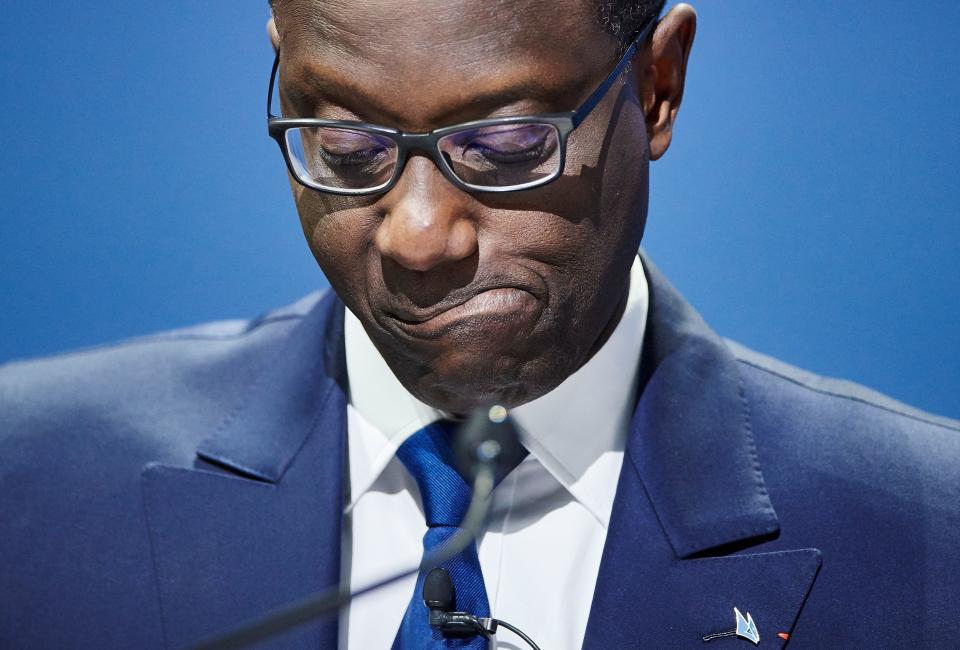How a Swiss spying scandal brought down Credit Suisse's boss
Tidjane Thiam’s resignation as chief executive of Credit Suisse (CS) marks a spectacular downfall for the high-profile executive and caps a sensational spying scandal that has rocked the usually sleepy world of Swiss banking.
Thiam, 57, was forced to quit on Friday in the wake of revelations about private investigators hired by Credit Suisse to tail its own executives.
While the French-Ivorian was cleared of involvement in the scandal, the slow drip of revelations made his position at the top difficult.

The lurid scandal — which includes cocktail party bust-ups, car chases, and clandestine operations at the bank — began last year and culminated in a public power struggle Thiam ultimately lost.
The bank’s board decided a new broom was needed to clean house and will be hoping his exit draws a line under the saga, which has dragged on the bank’s share price and shocked the banking world.
A Zurich car chase
The start of Thiam’s downfall can be traced to late September 2019. Local Swiss media and Bloomberg reported that Credit Suisse’s former wealth management chief, Iqbal Khan, had confronted a man in central Zurich who he believed was following him. Swiss police began investigating the incident, which Khan claimed happened after a car chase.
It emerged that Credit Suisse had hired investigators from a firm called ‘Investigo’ to follow Khan, who had recently been poached by the bank’s arch rivals UBS. The board of Credit Suisse launched an independent investigation in response. Bloomberg reported that the investigator who followed Khan died by suicide in late September.
Subsequent reporting suggested Thiam could have been involved in the decision to tail Khan. The Financial Times detailed a personal and professional falling out between Khan and his boss, including a row at a New Year’s Eve cocktail party over property. The pair owned houses next to each other on a lake in Zurich and Khan’s renovations had reportedly annoyed Thiam.

As speculation grew about Thiam’s involvement, investment analysts raised the possibility he could be ousted over the scandal.
The independent investigation ultimately cleared him when the findings were published in early October. Investigators found the chief executive had no knowledge of the operation and only found out when the story broke in the press.
Law firm Homburger said Credit Suisse’s chief operating officer and head of global security were behind the operation. The bank’s COO feared Khan could take staff and clients with him to UBS and so wanted to track his final weeks at the bank. Both the COO and head of security resigned.
Read more: Credit Suisse exec quits over spying scandal
Credit Suisse’s board said spying on Khan was “wrong and disproportionate and has resulted in severe reputational damage to the bank”.
However, Thiam appeared to have survived the incident, despite his dirty laundry with Khan being aired in the press.
A second spying scandal
Things changed in December when a Swiss newspaper revealed that a second Credit Suisse executive had been tailed in February 2019. Peter Goerke, who was head of HR at the time, was followed by investigators in a similar case to Khan’s.
Once again, the bank’s former COO and head of security were found to be behind the rogue operation. Credit Suisse said the pair “took care not to leave any identifiable trace in the bank’s systems” and lied about the incident when questioned.
However, the revelations raised questions about whether Thiam was asleep at the wheel and the culture at the bank under his leadership. Switzerland’s financial regulator launched an investigation into “questions of corporate governance” in response to the second spying revelation.
Credit Suisse’s board said it would introduce new “safeguards” and “more rigorous internal policies.” Chairman Urs Rohner said the spying cases had been “inexcusable”.

By February this year, Swiss media was reporting Rohner was looking at potential replacements for Thiam. Barclays analysts said this week that Credit Suisse’s share price had been underperforming due to expectations of a change at the top.
It looked like Thiam’s card was marked but there was a late twist in the drama as several significant Credit Suisse shareholders came out in support of the chief executive.
The bank’s second biggest shareholder told Bloomberg TV this week he supported Thiam and called for Rohner to go instead. Other top investors also publicly spoke out in support of the chief executive.
Read more: Credit Suisse CEO quits over spying scandal
Ultimately, though, Rohner won out. Thiam handed his resignation at a board meeting on Thursday and will leave the bank next Friday after it reports its full-year results.
Thiam reiterated that he had not known about the spying operations but said: “I regret that this happened and it should never have taken place.”
“It undoubtedly disturbed Credit Suisse and caused anxiety and hurt,” he said in his resignation statement.
He is set to be replaced by Thomas Gottstein, a 20-year Credit Suisse veteran who has been running the company’s Swiss banking operation.
“The change in leadership should allow the bank to move on and better focus on executing the strategy,” Andrew Stimpson, a Bank of America analyst who covers the stock, wrote on Friday.
However, questions remain.
“Why have events led to this outcome?” Barclays analysts wrote in an investment note. Investors will have questions about the bank’s strategy, board unity, and whether shareholders who spoke up in support of Thiam will now sell their stakes, Barclays wrote.
Credit Suisse stock (CSGN.SW) fell 2.3% on Friday when Thiam’s departure was announced.

 Yahoo Finance
Yahoo Finance 